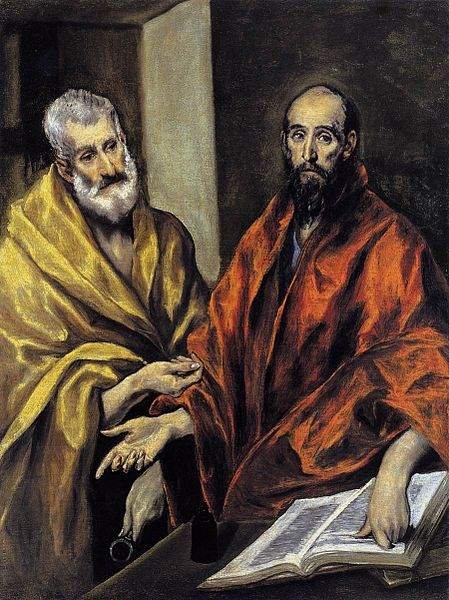Today is the Feast of Saints Peter and Paul, two saints who almost need no introduction: they are the most prominent men, besides Jesus, in the New Testament — Peter, the foremost of the Apostles, on whom Christ said he would found His Church; and Paul, the Apostle to the Gentiles, radically converted on the road to Damascus, and from then on a tireless preacher and writer for Christ. Together, the two became pillars of the Church of Rome, and watered it with the blood of their martyrdoms. Peter especially, hailed by the Roman Catholic Church as the first bishop of Rome, has come to be, for Catholics, a symbol of the authority of the Church. Paul, on the other hand, became a central figure of the Protestant Reformation: his writings on grace and faith and works, against the Judaizers, formed the basis of Martin Luther‘s theological interpretations. A number of Catholics I’ve talked to have seemed to distance themselves from Paul because of this, strangely. To me, though, Peter and Paul are the essential apostles who can bridge both the Catholic and Protestant traditions, and even offer hope of the reunion of all Christians.
There was a reflection in Magnificat last night, for the Vigil of Peter and Paul, that gave me a start and inspired this entry for today.
By celebrating the memory of these two great saints together, we remember how valiantly — and humanly — they struggled to bring together into one Church under one Gospel those who were divided by the differing heritage and belief of Jew and Gentile.
Up until the last two words, my mind was somewhere else — on our division today. I was nearly expecting to read of the “differing heritage and belief of Catholic and Protestant.”
St. Paul is my patron saint. As I journeyed to the Church, I pondered who I should choose; but when I prayed about it, I realized that there could be no other choice but Paul. For Paul was choosing me. There is no doubt in my mind at all that Paul has been looking out for me all these years since my youth. Most Protestants turn to Paul for his theology and intellect, but through all my troubles growing up, I turned to Paul for encouragement and comfort.
Do not be anxious about anything, but in everything by prayer and supplication with thanksgiving let your requests be made known to God. And the peace of God, which surpasses all understanding, will guard your hearts and your minds in Christ Jesus (Philippians 4:6-7).
When I reached Rome the first time and stood at Paul’s tomb, it was his words of encouragement that came flooding back to me, that brought me to knees and urged me to come face to face with God. And as I approached Rome again, toward the Church, I believe that Paul was praying for me, and welcoming me home.
I appeal to you, brothers, by the name of our Lord Jesus Christ, that all of you agree, and that there be no divisions among you, but that you be united in the same mind and the same judgment. For it has been reported to me by Chloe’s people that there is quarreling among you, my brothers. What I mean is that each one of you says, “I follow Paul,” or “I follow Apollos,” or “I follow Cephas,” or “I follow Christ.” Is Christ divided? Was Paul crucified for you? Or were you baptized in the name of Paul? (1 Corinthians 1:10-13 ESV)
And I truly believe that just as the Protestant Reformers’ interpretations of Paul remain at the heart of our division, a deeper reflection on both Peter and Paul — what they believed, what they wrote, what they stood for, and what they died for — can help heal our breach. “I appeal to you, brothers,” Paul wrote, “by the name of our Lord Jesus Christ, that all of you agree, and that there be no divisions among you, but that you be united in the same mind and the same judgment.” “Is Christ divided?,” he asks us (1 Corinthians 1). Tragically, we ourselves have divided the Body of Christ on earth, and have perpetuated that division for 500 years in the case of the Protestants; for 1,000 in the case of the Orthodox. And we ourselves are to blame for every day that we allow it to continue. Christ wants to return for a whole and spotless Bride. I believe we owe it our Lord, to His Church, and to His Apostles to urgently seek understanding and reconciliation as we near the end of this age.


“When I reached Rome the first time and stood at Paul’s tomb, it was his words of encouragement that came flooding back to me, that brought me to knees and urged me to come face to face with God. And as I approached Rome again, toward the Church, I believe that Paul was praying for me, and welcoming me home.” — beautiful thank you for sharing. I love reading your posts. You have a unique way of educating and inspiring .
Pingback: The First Roman Martyrs « The Lonely Pilgrim